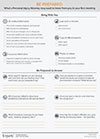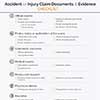
How do you know if a lawsuit is right for you?
It’s a big decision whether or not to file a lawsuit. There are several factors to consider to determine if it’s truly worth it. Below, you can find answers to all your questions to make an informed choice.
If you were injured and believe you’re entitled to file a lawsuit, or if you injured another person and believe a lawsuit will be filed against you, your mind is likely reeling with what to do, how to do it, and your likelihood of success.
The legal process can seem daunting, but there are a few principles that are nearly universal to personal injury lawsuits. Read on for answers to all of your questions about the ins and outs of an Illinois personal injury lawsuit.
Illinois personal injury lawsuit FAQ
1. Should I file a personal injury lawsuit?
Deciding whether to file a personal injury lawsuit can be complex and depends on various factors, including the severity of your injuries, potential compensation, and the strength of your case.
Here are some considerations:
- Extent of your injuries. If your injuries are minor, filing a lawsuit might not be worth the time, effort, and costs. However, if you have serious injuries that require extensive medical treatment, surgery, or ongoing care, you could be entitled to significant compensation.
- Impact on your life. Consider how your injuries affect your ability to work, perform daily tasks, and enjoy life. Permanent or long-term injuries often lead to higher damages and might justify a lawsuit.
- Current and future costs. Consider both your current medical bills and any anticipated future expenses. A lawsuit can help recover these costs, especially if you face long-term medical treatments or rehabilitation.
- Insurance limitations. If your medical expenses exceed your insurance policy limits, a personal injury lawsuit might help cover the gap. Also, consider the initial offer you received from the insurance company (if any). It’s important to determine whether it fully covers your losses—an insurance company will often make a lowball offer to settle quickly, but it’s not always fair to the claimant. Filing a lawsuit might give you more leverage in negotiating a better settlement, especially if the insurance company knows you’re serious about seeking fair compensation.
- Types of damages. Personal injury lawsuits can compensate you for economic damages (for instance, medical bills, lost wages, lost property) and non-economic damages (like pain and suffering). Some cases may also include punitive damages if the defendant’s conduct was particularly reckless.
- Comparable case outcomes. A personal injury attorney can help you estimate potential compensation based on similar cases. This can provide a realistic picture of the possible outcome.
- Strength of evidence. You’ll need to prove that the defendant was negligent and their negligence caused your injury. Your lawyer will inquire about whether you have strong evidence to support your lawsuit, like photos, video, witness statements, or expert testimony.
- Time commitment. A personal injury lawsuit could take months or years, especially if it is complex or goes to trial. Be prepared for lengthy litigation. You also might be required to attend hearings, depositions, and other proceedings. If you choose to file a lawsuit, you need to be prepared to invest the time and energy needed.
- Emotional considerations. A lawsuit could be emotionally taxing, particularly if the case involves a traumatic event. Some people prefer to settle quickly to avoid revisiting the incident in court.
- Are there future benefits or consequences? Injuries can lead to future health issues or limitations that might not be immediately apparent. A lawsuit can help secure compensation for future expenses and losses, providing you with greater financial security in the long term.
2. How can I decide whether I’m likely to win a personal injury lawsuit?
The basis for personal injury law is to make the plaintiff (victim) whole. That means they’re entitled to be restored to the financial condition they would be in if the injury hadn’t happened. It doesn’t unjustly enrich you, but it does provide for your costs for a loss that wasn’t your fault.
As an example, if you’re in a car accident and your car is totaled, the amount you recover in damages would be the replacement value of the car that was lost. So, if you were driving a nine-year-old sedan with 100,000 miles on it, the insurance company or the court would establish its value based on a Kelley Blue Book estimate or other reputable valuation source. You would be compensated the amount you’d have likely received if you’d sold or traded in that particular vehicle—in other words, if you’d sold the vehicle the day before the accident, the value you could earn from the sale is likely to be what you can receive after an accident. You can’t expect to receive damages that would buy you a brand-new luxury SUV.
Likewise, if you suffered a minor injury like a skinned knee that required only at-home treatment, you won’t recover damages because the injury didn’t cost you money.
Negligence is failing to exercise the appropriate level of care to prevent someone from being harmed. The majority of accidents happen because someone is careless. If this carelessness falls below a legally recognized standard, the person’s conduct is considered “negligent,” and the person is liable for any damages caused by their negligent conduct.
If you were injured but aren’t able to prove that another party was negligent, you can’t win damages. Sometimes an accident is just an accident—you tripped over your own two feet (it happens!) or you had an allergic reaction to something—there are all kinds of harms we experience daily, and it’s not necessarily anyone’s fault. A lawsuit is to be filed when it is someone’s fault.
3. What if I was partially at fault for my injury?
Illinois follows the Modified Comparative Fault Rule (also known as the 51% Rule). A plaintiff must be less than 51% at fault for their own injuries to recover any damages. If the plaintiff was partially responsible for their injury—up to 50%—they can recover damages reduced by their percentage of fault.
For instance, if the plaintiff’s damages were $100,000 but they were 30% at fault, their award would be $100,000 minus 30%, or $70,000. The court assigns the percentage of fault to each party.
4. How long do I have to file an Illinois personal injury lawsuit?
There is a statute of limitations on a lawsuit. The plaintiff has a specific amount of time from the date of the injury to file a lawsuit. After that time, they court will not hear the case.
In Illinois, there are different statutes of limitations, depending on the type of lawsuit:
| Personal injury | Two years from the date of the accident |
| Property damage | Five years from the date the damage occurred |
| Theft | Seven years |
| Medical malpractice | Two years from the date the patient became aware of the injury, but no more than four years from the date of the malpractice |
| Libel and slander | One year after the alleged incident |
| Fraud | Five years after the alleged incident |
| Oral contract | Five years |
| Written contract | Ten years |
There are exceptions, such as when the victim is a minor, the defendant being absent from the jurisdiction, and other things. It’s important to consult an Illinois personal injury lawyer to ensure you’re clear on the statute of limitations for your particular claim.
5. What will my Illinois lawsuit cost?
Most personal injury lawyers work on a contingency fee basis. You wouldn’t pay your lawyer up front; rather, your lawyer earns a percentage of the damages you receive. Most lawyers charge about 30% of damages. Therefore, you’re never paying your lawyer more (or even close to) than what you receive in damages.
However, there are other costs. You might have to pay for other professionals’ fees, like experts. There will be court filing fees, there could be costs you need to pay the lawyer for their transportation if they need to travel, other administrative fees, and so on. And, you need to allow for the financial cost of your own time—if you have to take time off from work to deal with court matters, your time is money, too.
6. What damages can I receive in an Illinois lawsuit?
- Medical expenses (past and future), including hospital and doctor visits, surgery, diagnostics like CT scan or MRI, prescription medication, prosthetics or assistive devices, and so on.
- Lost wages, past and future, including loss of earning potential because of a permanent disability caused by the accident or injury.
- Losses for physical pain and suffering.
- Losses for emotional distress if intentionally or negligently inflicted.
- Losses for diminished enjoyment of life, loss of consortium, etc.
- Punitive damages, awarded if there is injury where compensatory damages are also awarded and if the defendant’s actions were intentional, willful and wanton, or fraudulent.
7. How can I be prepared for my first meeting with an Illinois attorney?
The first step is to find the Illinois personal injury attorney who best fits your case. That might mean finding a lawyer who has particular experience in handling cases similar to yours, or it could mean the person whose personality and work style is the best match for you—remember, if there’s one single quality to look for in a lawyer, it has to be that they’re someone you trust. You might need to share sensitive information, and you need to be comfortable doing so. Withholding relevant information from your lawyer because you’re embarrassed can only hurt your case.
Enjuris offers several resources to help you find the best attorney for your needs:
Most attorneys offer a free initial consult. During that meeting, you should be prepared with any documentation or evidence to help the lawyer decide if it’s a case they want to handle. Have your own questions prepared, like whether they foresee a need for extensive expert testimony (which can be costly), whether you will be able to speak with them directly when you have questions or if most inquiries are handled by their paralegals or assistants, and other things that you might be wondering.
Finally, review these free downloadable Enjuris worksheets to guide you through the process.

A worksheet to prepare for your first meeting with a personal injury attorney – what to bring, what they'll ask
Download in PDF format

Checklist of 30 items to help you prepare for making a personal injury or accident claim
Download in PDF format

Worksheet with questions to ask a personal injury attorney to help determine if he or she will be a good fit for your case
Download in PDF format
See our guide Choosing a personal injury attorney.
